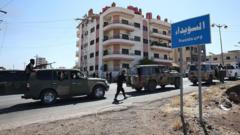Following the overthrow of Assad's regime, many foreign fighters who joined the Syrian rebels are now being incorporated into the Syrian army, sparking conflict between the country's new leadership and the United States, which views these individuals with suspicion and concern.
Foreign Fighters Find New Roles as Syria Rebuilds Its Military

Foreign Fighters Find New Roles as Syria Rebuilds Its Military
As Damascus seeks to fortify its military force post-civil war, foreign fighters who participated in the revolution are being integrated into the new army, raising tensions with the U.S. and posing challenges for Syria's leadership.
In the aftermath of Syria's prolonged civil war, the landscape is evolving as foreign fighters who once allied with local rebel groups now consider permanently establishing themselves within the reformed military structures of the nation. Amid attempts to solidify power following the ousting of Bashar al-Assad, President Ahmed al-Shara's administration perceives these fighters as vital partners who have shown steadfast commitment to their cause.
Since the civil conflict ignited in 2011, thousands of foreigners, motivated by diverse ideologies and objectives, flocked to Syria. Many fought alongside the initial protest groups, contributing to a series of revolts that ultimately shifted the power dynamic in the region. As of December, with Assad's regime being overthrown, the remaining foreign combatants have assumed a contentious status amid shifting diplomatic currents.
While al-Shara faces pressure from the U.S. government, which expresses alarm over the implications of these foreign allies, a divergence in perspectives has emerged. The U.S. has suggested strategies for diminishing the influence of these fighters in governance—a standpoint informed by the long-standing association of foreign participation with extremist factions such as ISIS.
Meanwhile, the Syrian administration moves forward with integrating foreign fighters into the military ranks. The government is under increasing pressure to establish a stable and effective military, and thus sees these veterans as allies in its effort to reclaim security and control over a post-war landscape.
The Syrian landscape remains fraught with complexities, as al-Shara navigates allegiances to the fighters who stood by him while working to mend relations with nations that regard those same individuals with disproportionate caution. As the future unfolds, the delicate balance between military rebuilding and diplomatic normalization looms as a core theme in Syria's path forward.




















